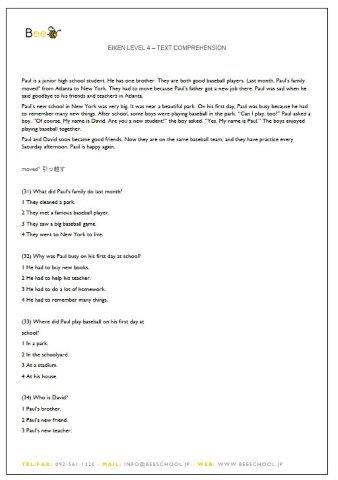(1) My friend lives in Brazil. It’s a nice ( ).
私の友達はブラジルに住んでいます。素敵な( )です。
(2) A: Jane, do you know the ( ) of Snow White?
A: ジェーン、『白雪姫』の( )を知っていますか?
B: Yes, of course. I love it.
B: はい、もちろん。大好きです。
(3) ( ) is the tenth month of the year.
( )は1年の10番目の月です。
(4) A: What do you usually have for ( ), John?
A: いつも( )に何を食べますか、ジョン?
B: Two eggs and toast.
B: 卵2つとトーストです。
(5) I ( ) this dictionary at home.
私はこの辞書を家で( )します。
(6) A: Do you play tennis, Yoko?
A: テニスをしますか、ヨーコ?
B: Yes. This is my ( ).
B: はい。これは私の( )です。
(7) In winter, I ski in the ( ) with my family.
冬には、家族と一緒に( )でスキーをします。
(8) A: Do you want a ( ) of tea?
A: お茶を( )どうぞ。
B: Yes, please.
B: はい、お願いします。
(9) A: I like Japanese music. ( ) about you?
A: 日本の音楽が好きです。( )あなたはどうですか?
B: I like it, too.
B: 私も好きです。
(10) A: Let’s ( ) camping this summer, Dad.
A: この夏、キャンプに( )しよう、お父さん。
B: Ok, Tom.
B: いいよ、トム。
(11) A: Bob, let’s have pizza for lunch.
A: ボブ、お昼にピザを食べよう。
B: All ( ) Tom.
B: 全て( )トム。
(12) Nancy usually ( ) up around seven o’clock.
ナンシーは通常7時ごろに( )起きます。
(13) A: Do you know that woman?
A: あの女性を知っていますか?
B: Yes, I ( ). teacher. She’s the new English teacher.
B: はい、( )。彼女は新しい英語の先生です。
(14) A: What is Jack doing now?
A: 今、ジャックは何をしていますか?
B: He ( ) in his room.
B: 彼は部屋で( )しています。
(15) This dictionary isn’t ( ).
この辞書は( )ではありません。
(16) Teacher: What day is it today?
先生:今日は何曜日ですか?
Student: ( )
生徒:( )
(17) Father: Please don’t eat in the car, Beth.
父:車の中で食べないでください、ベス。
Girl: ( ) Dad.
少女:( )お父さん。
(18) Girl: What color is your new phone?
少女:あなたの新しい電話は何色ですか?
Boy: ( )
少年:( )
(19) Girl: Can we go shopping today, Dad?
少女:今日買い物に行けますか、お父さん?
Father: ( )
父:( )
(20) Mother: I can’t find the cat, Joe.
母:猫が見つからないわ、ジョー。
Boy: ( ) mom.
少年:( )お母さん。
